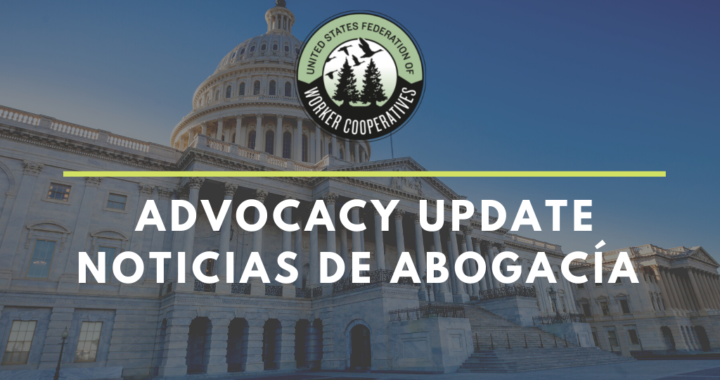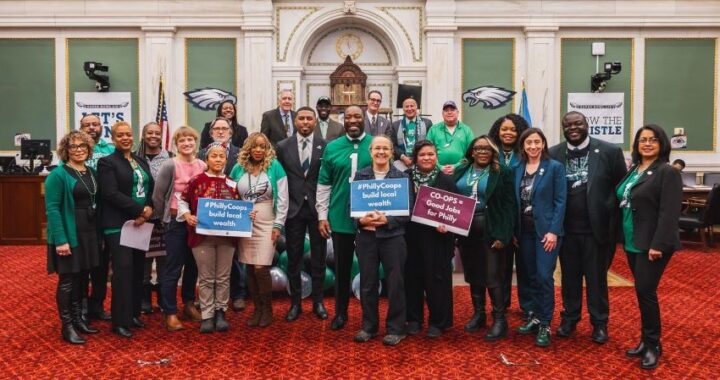On December 6, 2022, the Committee on Small Business’s Subcommittee on Oversight, Investigations, and Regulations will hold a hybrid hearing titled: “Building Sustainable Businesses through Employee Ownership at SBA.” Led by Subcommittee Chairman Rep. Dean Phillips (MN), the hearing prompted members to examine the challenges faced by employee-owned businesses in accessing affordable capital from the SBA, and SBA’s efforts to address those issues. The hearing featured a panel of employee ownership experts, including the USFWC’s Policy Director:
- Ms. Mo Manklang, United States Federation of Worker Cooperatives (Testimony)
- Mr. Corey Rosen, National Center for Employee Ownership (Testimony)
- Mr. Keith D. Butcher, Mosaic Capital, MO (Testimony)
- Mr. Scott Lockard, Hampton Enterprises, NE (Testimony)
You can view the recording of the session here, starting at 9:44. There is a recess in the middle of this recording, and the session picks back up at 1 hour and 35 minutes.
Ranking Member Rep. Van Duyne (TX-24), Reps Mike Flood (NE-1) and Rep. Dan Meuser (PA-09) were also in attendance. The opening comments of Rep. Phillips illustrates a deep commitment to employee ownership:
“For many owning and operating a successful small business is the embodiment of the American Dream. Of course, running a small business is not for the faint of heart. It requires hard work, and brings new challenges every single day. But the payoff can be immense. Successful businesses create jobs, invest in their communities, and drive our country forward. This committee serves as the voice for entrepreneurs in the U.S. Congress, and it is our responsibility to ensure that this dream as as accessible to as many Americans as humanly possible. An that is why I am such a proponent of the concept of employee ownership.” said Rep. Phillips. “I grew up in a family in which business was a means to an end. And the end was not just making as much money as possible; rather, sharing as much with the employees and communities that made it possible.”
“Employee owned companies take various forms, but they are united by the fact that they align with the interests of the workers AND the owners. When an employee-owned business grows, the workers and the community benefit directly… in many cases workers at these businesses boast higher pay, greater job security, and better benefits, such as higher retirement savings. In addition to helping workers, the employee ownership model also provides a way for retiring small business owners to pass their businesses along to the people who know it the very best- their employees. Employee ownership is an innovative way to address this retirement wave that’s forthcoming. Moreover, converting to an employee-owned structure is an effective succession plan to preserve a firm’s continuity, foster employee commitment, and build lasting economic value in a community. Given the long list of benefits associated with this model, it is vital that we ensure these businesses have access to the federal initiatives meant to support all small firms. Unfortunately, despite the efforts of Chairwoman Velazquez, myself, and members of this committee, ESOPs and co-ops continue to be virtually locked out of key Small Business Administration programs… ESOPs and co-ops are often kept out of the 7(a) program because of their unique ownership structure and SBA’s unwillingness to align their programs to meet the needs of these entrepreneurs. It is clear that Congress must do more to support more employee owned small businesses.”
Rep. Flood also expressed support for cooperatives:
“Finding ways to make businesses work especial in rural America is important and it does require some creativity in structure. One of the benefits of cooperatives, and we’ve seen cooperatives scale very large in agriculture areas in Nebraska. One of the benefits of the LCA is that you have the ability to bring in that private investment to help affect the buyout and allow the rest of the employees to have the opportunity to enjoy meaningful ownership and build some wealth.”
We look forward to working with the committee members to educate on employee ownership and strategize on how cooperatives can address immediate and long-term challenges for small businesses.
Advocates of worker co-ops are encouraged to submit written comment support.
Here is a template letter that will work for both; simply add to your letterhead and include some context as to why you or your organization is providing comment.
Comments for the hearing can be sent to Lauren Finks at Lauren.Finks@mail.house.gov until 5 days after the hearing (December 14).

